Photographs: Utpal Baruah/Reuuters Kavita Chowdhury in New Delhi
The Congress is actively contesting these Lok Sabha polls but vice-president Rahul Gandhi is marshalling the party towards a possible general election in two years. Kavita Chowdhury reports.
“We are going to win the election. We are getting 200-plus seats,” Gandhi said in an interview to the Press Trust of India last week. Whatever Gandhi, as leader of the 127-year-old party, might maintain in public, sources say he is clear the 2014 Lok Sabha election is not for the Congress.
Senior Congress leaders and partymen Business Standard spoke to over the past weeks insist the writ is unambiguous: Focus on long-term party building and not on the polls. Gandhi believes there will be another election in two years, and the Congress should be ready for that one.
The appointments of Sachin Pilot in Rajasthan and Arun Yadav in Madhya Pradesh just months before the general elections, sidelining stalwarts like Ashok Gehlot, Kamal Nath and Digvijaya Singh, are a step in that direction.
Please …
Building grass roots cadre
Image: A Congress supporter takes a picture while listening to Rahul Gandhi during a rally in Bardoli, GujaratPhotographs: Amit Dave/Reuters
When senior Congress leaders like P Chidambaram, G K Vasan and Jayanthi Natarjan expressed unwillingness to contest, Gandhi reportedly said in a central election committee meeting the party needed to be built in Tamil Nadu and veterans must stay the course, not run away.
By the time the state holds assembly elections in two years, the Congress intends to put up a strong fight there.
Ticket selection for the Lok Sabha elections plays into this theme. The Congress has retained sitting MPs in the majority of constituencies and fielded youngsters in weak seats.
“The rationale being the first-timers will lose, they will cultivate their constituencies and build a base for the party,” says a party leader involved in the screening process.
Please …
Alliance building
Image: NCP chief Sharad Pawar speaks with Congress president Sonia Gandhi during a rally in NagpurPhotographs: Arko Dutta/Reuters
The Congress, which had set up a committee under Defence Minister A K Antony in November 2012 to forge alliances with regional parties, has gone slow on pre-poll tie-ups.
“Gandhi wants alliances with like-minded allies like the Nationalist Congress Party. His view is why have alliances with parties where the Congress writ will not run?” says a senior party leader.
The Dravida Munnetra Kazhagam and the Congress are unlikely to be on the same page on the Sri Lanka issue, Gandhi explained to some leaders. The Congress has chosen to fight alone in Tamil Nadu in spite of a possible rout. In the past, it relied on regional parties in the state to bring in the seats.
Gandhi’s party revamp includes creating teams of dedicated workers up to the booth level, a task that may take more than two years to implement, state leaders confess.
Please …
Attracting Dalit vote bank
Image: Supporters of the Congress party listen to Rahul Gandhi during a rally in Uttar PradeshPhotographs: Reuters
K Raju, a former bureaucrat picked by Gandhi to head the Congress’ cell on Scheduled Castes, told Business Standard: “My mandate from Rahul Gandhi is clear: Put in place a strategy for the party to connect with Scheduled Castes, identify future leaders from this community and work towards Dalit engagement and empowerment.”
The Congress wants to get back a vote bank that has shifted allegiance to the Bahujan Samaj Party.
Raju has set up three-member teams in panchayats to inform households of the Congress’ welfare measures for them, including the food and land Bills. He says his measures will take time to deliver electoral benefits, but Gandhi is not interested in short-term politics.
Congress primaries
Ever since Gandhi took over as Congress vice-president in January 2013, he has been pushing for radical changes within the party. He introduced the idea of US-style primaries at the All India Congress Committee session this January.
Initially eager to use these in all 543 Lok Sabha seats for transparent candidate selection, Gandhi was eventually dissuaded by party elders. A pilot project is on in 17 seats but the next time the country goes to the polls, Gandhi is likely to use primaries to curb arbitrariness in ticket distribution.
“Till now, he has not implemented half the things he would like to do. After the 2014 polls, he says, he will change the Congress in ways we would never have imagined,” a Congress stalwart says.
Please …
Poor Parliament record
Photographs: Reuters
His detractors, however, question his commitment to change and his much-talked promise of “giving power back to the legislator”, given the fact that his record as a parliamentarian is not exemplary.
According to PRS Legislative Research, which collates records from Parliament's own data, during the second term of the UPA, Gandhi’s attendance in Parliament was 43 per cent, far below the average of 76 per cent. He spoke only twice in the House, in August 2011 on the Jan Lok Pal Bill and in December 2013 on the Lok Pal and Lok Ayuktas Bill. He has not put up a single question or floated any Private Member’s Bills.
The Bharatiya Janata Party has questioned his seriousness as a legislator. If Gandhi has to emerge as the natural leader of the Congress, he has to lead the party in Parliament and not only from the confines of party forums and public rallies.

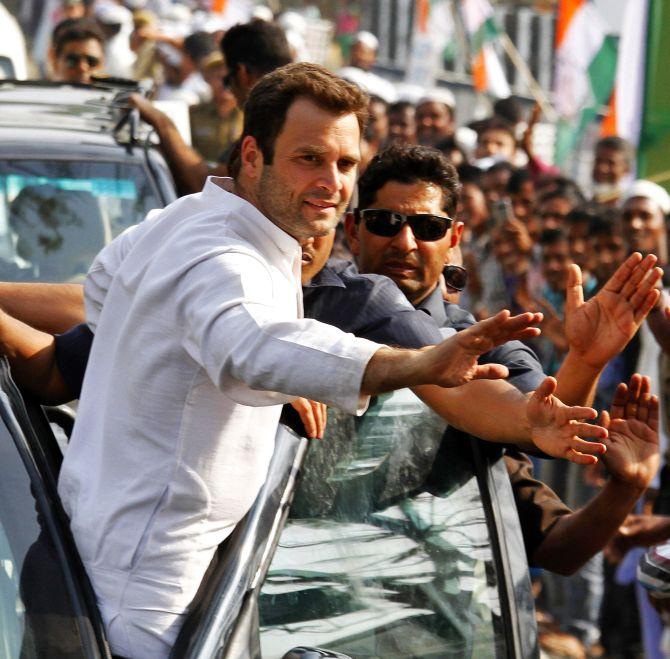
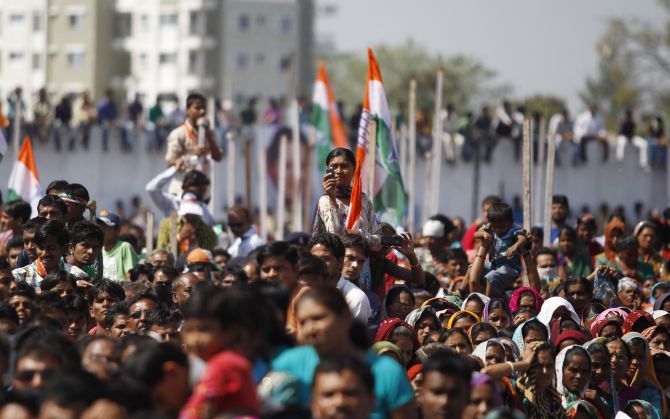
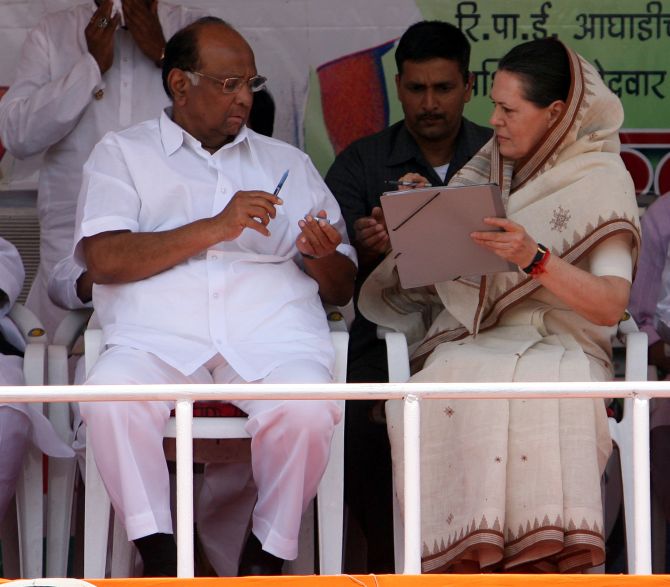
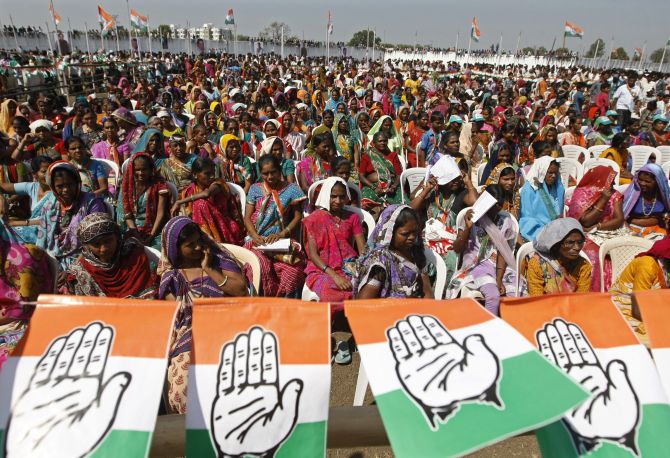
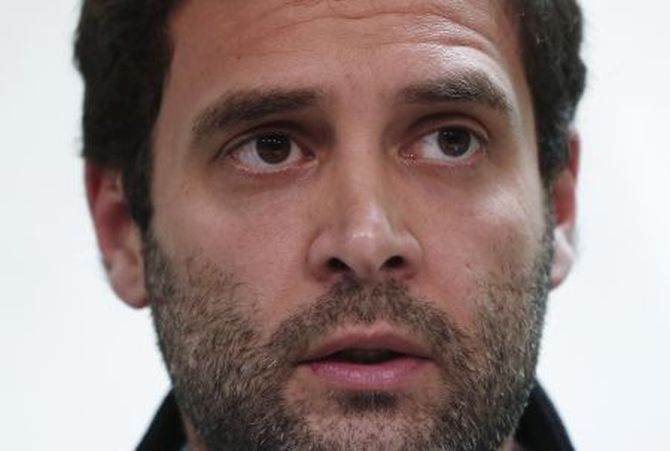

article